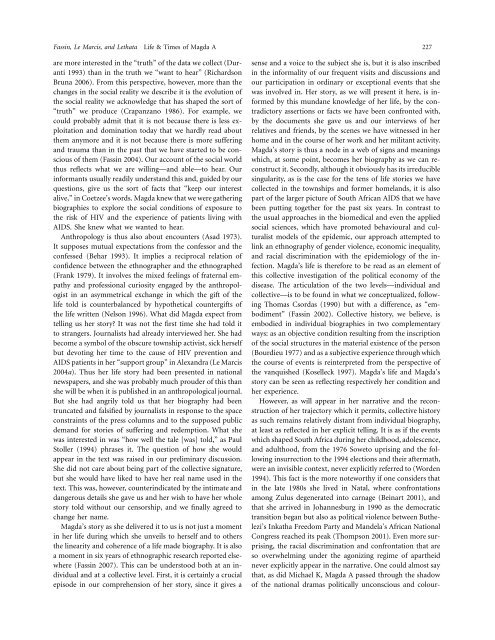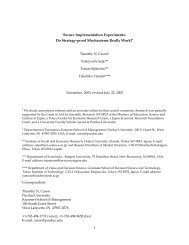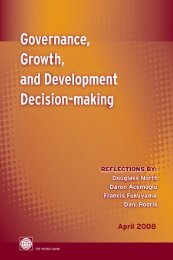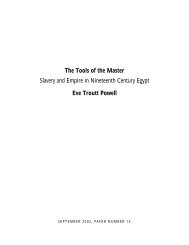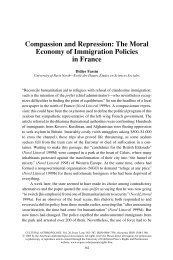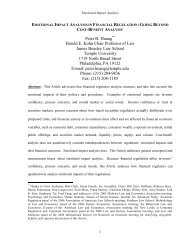Life & Times of Magda A: Telling a Story of Violence in South Africa
Life & Times of Magda A: Telling a Story of Violence in South Africa
Life & Times of Magda A: Telling a Story of Violence in South Africa
Create successful ePaper yourself
Turn your PDF publications into a flip-book with our unique Google optimized e-Paper software.
Fass<strong>in</strong>, Le Marcis, and Lethata <strong>Life</strong> & <strong>Times</strong> <strong>of</strong> <strong>Magda</strong> A 227<br />
are more <strong>in</strong>terested <strong>in</strong> the “truth” <strong>of</strong> the data we collect (Duranti<br />
1993) than <strong>in</strong> the truth we “want to hear” (Richardson<br />
Bruna 2006). From this perspective, however, more than the<br />
changes <strong>in</strong> the social reality we describe it is the evolution <strong>of</strong><br />
the social reality we acknowledge that has shaped the sort <strong>of</strong><br />
“truth” we produce (Crapanzano 1986). For example, we<br />
could probably admit that it is not because there is less exploitation<br />
and dom<strong>in</strong>ation today that we hardly read about<br />
them anymore and it is not because there is more suffer<strong>in</strong>g<br />
and trauma than <strong>in</strong> the past that we have started to be conscious<br />
<strong>of</strong> them (Fass<strong>in</strong> 2004). Our account <strong>of</strong> the social world<br />
thus reflects what we are will<strong>in</strong>g—and able—to hear. Our<br />
<strong>in</strong>formants usually readily understand this and, guided by our<br />
questions, give us the sort <strong>of</strong> facts that “keep our <strong>in</strong>terest<br />
alive,” <strong>in</strong> Coetzee’s words. <strong>Magda</strong> knew that we were gather<strong>in</strong>g<br />
biographies to explore the social conditions <strong>of</strong> exposure to<br />
the risk <strong>of</strong> HIV and the experience <strong>of</strong> patients liv<strong>in</strong>g with<br />
AIDS. She knew what we wanted to hear.<br />
Anthropology is thus also about encounters (Asad 1973).<br />
It supposes mutual expectations from the confessor and the<br />
confessed (Behar 1993). It implies a reciprocal relation <strong>of</strong><br />
confidence between the ethnographer and the ethnographed<br />
(Frank 1979). It <strong>in</strong>volves the mixed feel<strong>in</strong>gs <strong>of</strong> fraternal empathy<br />
and pr<strong>of</strong>essional curiosity engaged by the anthropologist<br />
<strong>in</strong> an asymmetrical exchange <strong>in</strong> which the gift <strong>of</strong> the<br />
life told is counterbalanced by hypothetical countergifts <strong>of</strong><br />
the life written (Nelson 1996). What did <strong>Magda</strong> expect from<br />
tell<strong>in</strong>g us her story? It was not the first time she had told it<br />
to strangers. Journalists had already <strong>in</strong>terviewed her. She had<br />
become a symbol <strong>of</strong> the obscure township activist, sick herself<br />
but devot<strong>in</strong>g her time to the cause <strong>of</strong> HIV prevention and<br />
AIDS patients <strong>in</strong> her “support group” <strong>in</strong> Alexandra (Le Marcis<br />
2004a). Thus her life story had been presented <strong>in</strong> national<br />
newspapers, and she was probably much prouder <strong>of</strong> this than<br />
she will be when it is published <strong>in</strong> an anthropological journal.<br />
But she had angrily told us that her biography had been<br />
truncated and falsified by journalists <strong>in</strong> response to the space<br />
constra<strong>in</strong>ts <strong>of</strong> the press columns and to the supposed public<br />
demand for stories <strong>of</strong> suffer<strong>in</strong>g and redemption. What she<br />
was <strong>in</strong>terested <strong>in</strong> was “how well the tale [was] told,” as Paul<br />
Stoller (1994) phrases it. The question <strong>of</strong> how she would<br />
appear <strong>in</strong> the text was raised <strong>in</strong> our prelim<strong>in</strong>ary discussion.<br />
She did not care about be<strong>in</strong>g part <strong>of</strong> the collective signature,<br />
but she would have liked to have her real name used <strong>in</strong> the<br />
text. This was, however, counter<strong>in</strong>dicated by the <strong>in</strong>timate and<br />
dangerous details she gave us and her wish to have her whole<br />
story told without our censorship, and we f<strong>in</strong>ally agreed to<br />
change her name.<br />
<strong>Magda</strong>’s story as she delivered it to us is not just a moment<br />
<strong>in</strong> her life dur<strong>in</strong>g which she unveils to herself and to others<br />
the l<strong>in</strong>earity and coherence <strong>of</strong> a life made biography. It is also<br />
a moment <strong>in</strong> six years <strong>of</strong> ethnographic research reported elsewhere<br />
(Fass<strong>in</strong> 2007). This can be understood both at an <strong>in</strong>dividual<br />
and at a collective level. First, it is certa<strong>in</strong>ly a crucial<br />
episode <strong>in</strong> our comprehension <strong>of</strong> her story, s<strong>in</strong>ce it gives a<br />
sense and a voice to the subject she is, but it is also <strong>in</strong>scribed<br />
<strong>in</strong> the <strong>in</strong>formality <strong>of</strong> our frequent visits and discussions and<br />
our participation <strong>in</strong> ord<strong>in</strong>ary or exceptional events that she<br />
was <strong>in</strong>volved <strong>in</strong>. Her story, as we will present it here, is <strong>in</strong>formed<br />
by this mundane knowledge <strong>of</strong> her life, by the contradictory<br />
assertions or facts we have been confronted with,<br />
by the documents she gave us and our <strong>in</strong>terviews <strong>of</strong> her<br />
relatives and friends, by the scenes we have witnessed <strong>in</strong> her<br />
home and <strong>in</strong> the course <strong>of</strong> her work and her militant activity.<br />
<strong>Magda</strong>’s story is thus a node <strong>in</strong> a web <strong>of</strong> signs and mean<strong>in</strong>gs<br />
which, at some po<strong>in</strong>t, becomes her biography as we can reconstruct<br />
it. Secondly, although it obviously has its irreducible<br />
s<strong>in</strong>gularity, as is the case for the tens <strong>of</strong> life stories we have<br />
collected <strong>in</strong> the townships and former homelands, it is also<br />
part <strong>of</strong> the larger picture <strong>of</strong> <strong>South</strong> <strong>Africa</strong>n AIDS that we have<br />
been putt<strong>in</strong>g together for the past six years. In contrast to<br />
the usual approaches <strong>in</strong> the biomedical and even the applied<br />
social sciences, which have promoted behavioural and culturalist<br />
models <strong>of</strong> the epidemic, our approach attempted to<br />
l<strong>in</strong>k an ethnography <strong>of</strong> gender violence, economic <strong>in</strong>equality,<br />
and racial discrim<strong>in</strong>ation with the epidemiology <strong>of</strong> the <strong>in</strong>fection.<br />
<strong>Magda</strong>’s life is therefore to be read as an element <strong>of</strong><br />
this collective <strong>in</strong>vestigation <strong>of</strong> the political economy <strong>of</strong> the<br />
disease. The articulation <strong>of</strong> the two levels—<strong>in</strong>dividual and<br />
collective—is to be found <strong>in</strong> what we conceptualized, follow<strong>in</strong>g<br />
Thomas Csordas (1990) but with a difference, as “embodiment”<br />
(Fass<strong>in</strong> 2002). Collective history, we believe, is<br />
embodied <strong>in</strong> <strong>in</strong>dividual biographies <strong>in</strong> two complementary<br />
ways: as an objective condition result<strong>in</strong>g from the <strong>in</strong>scription<br />
<strong>of</strong> the social structures <strong>in</strong> the material existence <strong>of</strong> the person<br />
(Bourdieu 1977) and as a subjective experience through which<br />
the course <strong>of</strong> events is re<strong>in</strong>terpreted from the perspective <strong>of</strong><br />
the vanquished (Koselleck 1997). <strong>Magda</strong>’s life and <strong>Magda</strong>’s<br />
story can be seen as reflect<strong>in</strong>g respectively her condition and<br />
her experience.<br />
However, as will appear <strong>in</strong> her narrative and the reconstruction<br />
<strong>of</strong> her trajectory which it permits, collective history<br />
as such rema<strong>in</strong>s relatively distant from <strong>in</strong>dividual biography,<br />
at least as reflected <strong>in</strong> her explicit tell<strong>in</strong>g. It is as if the events<br />
which shaped <strong>South</strong> <strong>Africa</strong> dur<strong>in</strong>g her childhood, adolescence,<br />
and adulthood, from the 1976 Soweto upris<strong>in</strong>g and the follow<strong>in</strong>g<br />
<strong>in</strong>surrection to the 1994 elections and their aftermath,<br />
were an <strong>in</strong>visible context, never explicitly referred to (Worden<br />
1994). This fact is the more noteworthy if one considers that<br />
<strong>in</strong> the late 1980s she lived <strong>in</strong> Natal, where confrontations<br />
among Zulus degenerated <strong>in</strong>to carnage (Be<strong>in</strong>art 2001), and<br />
that she arrived <strong>in</strong> Johannesburg <strong>in</strong> 1990 as the democratic<br />
transition began but also as political violence between Buthelezi’s<br />
Inkatha Freedom Party and Mandela’s <strong>Africa</strong>n National<br />
Congress reached its peak (Thompson 2001). Even more surpris<strong>in</strong>g,<br />
the racial discrim<strong>in</strong>ation and confrontation that are<br />
so overwhelm<strong>in</strong>g under the agoniz<strong>in</strong>g regime <strong>of</strong> apartheid<br />
never explicitly appear <strong>in</strong> the narrative. One could almost say<br />
that, as did Michael K, <strong>Magda</strong> A passed through the shadow<br />
<strong>of</strong> the national dramas politically unconscious and colour-


